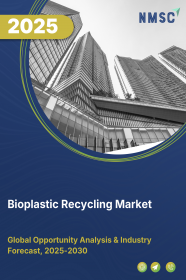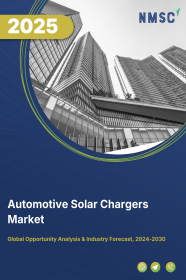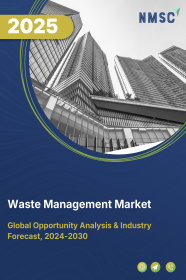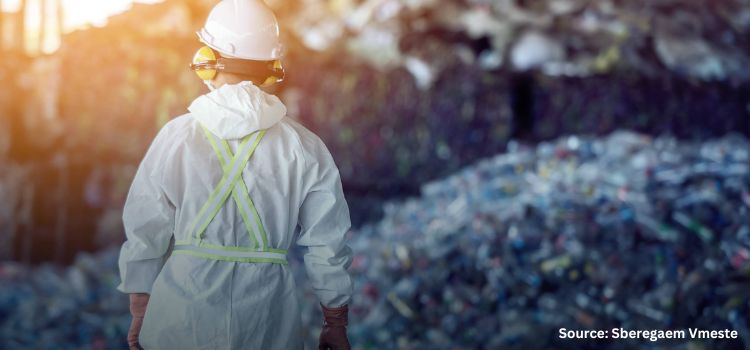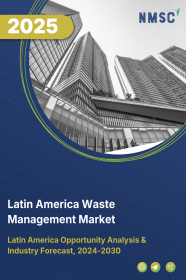
Latin America Waste Management Market by Waste Type (Municipal Solid Waste (MSW) or Household, Industrial, and Commercial) and by Waste Treatment (Composting, Incineration, Controlled Landfill, Uncontrolled Landfill, Sanitary Landfill, Open Dump, and Recycling)– Opportunity Analysis and Industry Forecast, 2024 – 2030
Industry: Energy & Power | Publish Date: 18-Feb-2025 | No of Pages: 20 | No. of Tables: 82 | No. of Figures: 47 | Format: PDF | Report Code : EP1254
US Tariff Impact on Latin America Waste Management Market
Trump Tariffs Are Reshaping Global Business
Latin America Waste Management Market Overview
Latin America Waste Management Market size was valued at USD 6.39 billion in 2023, and is predicted to reach USD 10.37 billion by 2030, at a CAGR of 6.1% from 2024 to 2030.
The Latin America waste management market involves a wide range of services and activities aimed at managing and mitigating the impact of waste generated by various sectors including residential, commercial, industrial, and healthcare. It includes the collection, transportation, processing, recycling, and disposal of waste materials in a manner that is environmentally responsible and sustainable. The market also involves the development and implementation of technologies and practices that promote waste reduction, resource recovery, and the safe handling of hazardous materials.
Key components of the waste recovery market include waste collection services, recycling facilities, waste-to-energy plants, landfill operations, and environmental consulting services. As awareness of environmental issues grows, the waste recovery market continues to expand, driven by growing population, technological advancements, and increasing public demand for sustainable waste solutions.
The Proactive Government Initiatives Significantly Fuels the Latin America Waste Management Market Growth
The Brazilian government's proactive initiatives significantly boost the growth of the waste management market. Through various programs and policies aimed at improving waste recovery practices, such as stricter regulations on waste segregation, increased funding for waste processing facilities, and support for recycling and composting initiatives, the government fosters an environment conducive to market expansion.
As per the latest report published by International Trade Administration (ITA), the Brazilian Government enacted the National Solid Waste Plan establishing goals and mechanisms to modernize solid waste management in Brazil over the next 20 years. The National Solid Waste Plan sets goals to increase recycling rates throughout Brazil 48% by 2040. These efforts enhance the efficiency of waste recovery systems, encourage sustainable practices, and stimulate investments in innovative waste solutions, driving overall market growth in Brazil.
Rising Environmental Concerns Accelerate Growth of Argentina's Waste Management Market
The rising concern about the environmental impact of waste generation is propelling the growth of the Latin America waste management market trends. As awareness of the detrimental effects of waste on ecosystems and public health increases, there is a heightened demand for effective waste management solutions. As per the latest report published by the Climate and Clean Air Coalition (CCAC), in Argentina it is estimated that up to 50% of methane emissions derive from organic waste decomposing in landfill.
This growing environmental consciousness drives investments in advanced waste processing technologies, recycling programs, and sustainable waste reduction strategies, thereby accelerating market expansion.
Lack of Adequate Waste Processing Facilities Hinders the Growth of the Market
The lack of adequate waste processing facilities, insufficient recycling infrastructure, and outdated waste collection systems present substantial challenges and hinders the growth of the market. This situation is exacerbated by insufficient recycling infrastructure, that limits the ability to effectively separate, process, and repurpose materials.
The Adoption of Waste-To-Energy Technologies Creates Future Growth Opportunities in the Market
The adoption of waste-to-energy technologies such as incineration, anaerobic digestion, and gasification presents a significant growth opportunity for the waste management market as these technologies convert waste materials into usable energy, reducing landfill dependency and contributing to sustainable energy generation.
By transforming waste into a valuable resource, waste-to-energy solutions promote environmental sustainability and drive market expansion. This innovative approach aligns with global trends toward circular economy practices and offers economic benefits by generating energy from waste that creates a promising avenue for growth of the waste recovery sector.
Competitive Landscape
The promising key players operating in the Latin America waste management industry includes Estre Ambiental, Inc., Solví Participações S.A., Cliba, Veolia Argentina, KDM Empresas, Interaseo, Petramás S.A., EMASEO EP, R&G Ingeniería y Soluciones Ambientales, RECYCLE S.A. de R.L, and others.
Latin America Waste Management Market Key Segments
By Waste Type
-
Municipal Solid Waste (MSW) or Household
-
Food
-
Paper and Cardboard
-
Plastic
-
Glass
-
Metal
-
Others
-
-
Industrial
-
Manufacturing Waste
-
Construction & Demolition Waste
-
Agriculture Waste
-
Other Industrial waste
-
-
Commercial
By Waste Treatment
-
Composting
-
Incineration
-
Controlled Landfill
-
Uncontrolled Landfill
-
Sanitary Landfill
-
Open Dump
-
Recycling
Key Players
-
Estre Ambiental, Inc.
-
Solví Participações S.A.
-
Cliba
-
Veolia Argentina
-
KDM Empresas
-
Interaseo
-
Petramás S.A.
-
EMASEO EP
-
R&G Ingeniería y Soluciones Ambientales
-
RECYCLE S.A. de R.L
REPORT SCOPE AND SEGMENTATION:
|
Parameters |
Details |
|
Market Size Value in 2023 |
USD 6.39 billion |
|
Revenue Forecast in 2030 |
USD 10.37 billion |
|
Value Growth Rate |
CAGR of 6.1% from 2024 to 2030 |
|
Analysis Period |
2023–2030 |
|
Base Year Considered |
2023 |
|
Forecast Period |
2024–2030 |
|
Market Size Estimation |
Billion (USD) |
|
Growth Factors |
|
|
Companies Profiled |
10 |
|
Customization Scope |
Free customization (equivalent up to 80 working hours of analysts) after purchase. Addition or alteration to country, regional, and segment scope. |
|
Pricing and Purchase Options |
Avail customized purchase options to meet your exact research needs. |

















 Speak to Our Analyst
Speak to Our Analyst



